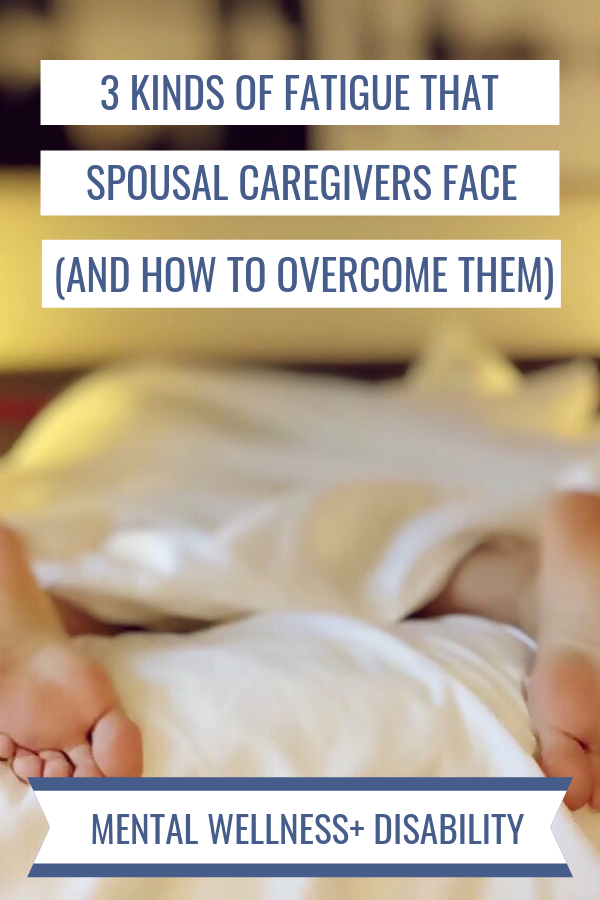There’s a common complaint among partners caring for a disabled partner:
“I’m so exhausted”
It frustrates my counseling clients who have a disabled spouse. They hate that they can’t rebound from this unshakable tiredness.
At a time when they need to be at their most alert and capable, they feel run down, foggy, and never quite themselves. So besides worrying about their spouse’s rehabilitation, they feel down on themselves.
It helps when I point out to them that caregivers aren’t fighting a general over-tiredness. They are actually faced with three very different kinds of fatigue.
The three kinds of fatigue that caregivers face

Caring for a disabled partner leads to decision fatigue
You have experienced decision fatigue, even if you didn’t know the name for it. Decision fatigue is a tendency to make choices of deteriorating quality after a long session of decision making.
As we work through a list of decisions to make, the more likely we are to make poor decisions. We are also more likely to feel more drained by each decision we make.
Ever have a goal of getting healthier, but you aren’t motivated to go to the gym after a long day? That’s decision fatigue. You make a choice that’s inconsistent with your stated goal. You do it because you’re too tired to make the right choice.
Decision fatigue can have serious implications. One study demonstrated this by looking at the decisions of parole judges.
Imagine what might affect parole judges’ decisions. You might be thinking of factors like the kinds of crimes committed. Or the number of repeat offenses a criminal had.
Instead, researchers found that time of day was the strongest predictor of judges’ choices. The judges ruled in favor of granting parole 65% of the time in the early morning. They were also at 65% immediately after their snack or lunch break. But as time passed from each of those points? The likelihood of a criminal receiving a favorable ruling dropped to 10% or lower.
As the authors explain, when the judges “make repeated rulings, they show an increased tendency to rule in favor of the status quo.”
How to cope with decision fatigue when you are caring for a disabled spouse
Some research suggests decision fatigue happens more often when making decisions for yourself. When we make decisions for another person, we seem to be better at sustaining good choices.
For this reason, my suggestion for coping with decision fatigue is a simple one.
Minimize the decisions you must make.
Especially cut down on the choices that you must make that have to do with yourself. Then you can focus your energy on the decisions that affect your spouse’s care.
Some of my observant clients notice that I only wear navy and white with accents of green or yellow.
Years ago I started feeling the crunch of decision fatigue. I resolved to make fewer choices throughout the day, and I started in my closet. I don’t stress over what clothing I’ll wear. Everything in my closet coordinates in a limited color palette. Any top I choose will match any pants I have.
Many other people have taken this ‘less choice = better choices’ approach to clothes. This includes Steve Jobs and former President Barack Obama.
Another option for reducing the number of decisions you must make each day is to use a menu plan. You can be as detailed or loose with this as you’d like. Your breakfast plan might be as simple as:
- Monday: Eggs
- Tuesday: Toast
- Wednesday: Cereal
And so on.
Or, you could be more detailed and identify how you’ll cook the eggs on Monday, what you’ll put on the toast on Tuesday. It’s up to you to find the level of pre-planning that is most beneficial to you.
Map out the decisions you’ll need to make each day
Another option for avoiding decision fatigue is to plan ahead. Instead of making a ‘to-do’ list for the day, make a ‘to-decide’ list. Instead of planning for things you must do, you’re going to look ahead and map out the decisions you’ll need to make in a day.
Let’s suppose your spouse has a physical therapy appointment today. You know that you’ll be out of town at the time of next week’s appointment. During today’s appointment, you’ll have to decide whether to cancel or try to reschedule next week.
Knowing what we do about decision fatigue, we know that as the day goes on, you’re more likely to make a poor choice. It’s true that the physical therapist will present the decision later in the day. But that doesn’t mean that you must wait until later to think through your options. Making your decision in the morning might save you from making a choice you’ll later regret.
Eat something.
Remember the judges? They shook their tendency toward deciding in favor of the status quo by taking a break and eating something.
Set yourself up for decision making success. Take a short break and eating a healthy snack before making a big decision.
Caring for a disabled partner leads to physical fatigue
If you’re caring for a partner who has a disability, you’re likely familiar with physical exhaustion. Aiding with transfers, pushing a wheelchair, stabilizing your spouse while they walk. These and the countless other care-giving tasks you’re doing are manual labor.
Physical fatigue can also result from poor sleep quality or insufficient sleep. How has your sleep been? If you’re anything like my counseling clients, nighttime is when your mind swells with anxious thoughts. Many new caregivers report increased sleep difficulty after their partner becomes disabled. Of course, lack of sleep only worsens the physical exhaustion you’re facing.
How to cope with physical fatigue when you are caring for a disabled spouse
The key to avoiding physical fatigue from care-giving is delegating where possible. Of course, the cornerstone of delegation is trust.
You must trust the people you invite to provide care to your partner.
You may choose to delegate care-giving responsibility to family, friends, or paid caregivers. Whoever you delegate care it, you must trust those people. Create detailed training information (including written information, pictures, and even videos if applicable). Watch the people you’re training complete the care-giving tasks you’re assigning to them. Don’t entrust your partner to their care until you trust that they understand what to do.
Otherwise you’ll be trading physical fatigue for guilt and worry. That’s an exchange that doesn’t move you any closer to emotional well-being.
If you want more guidance on hiring a paid caregiver to assist, be sure to read this post!
Follow good sleep hygiene rules.
Here’s a quick list of the most critical points.
Use your bed only for sleep or sex. Not for watching TV, talking on the phone, or other any other activities.
If you’re awake after 20 minutes without falling asleep, get out of bed and do a quiet, peaceful activity. Over time, your brain can learn to associate places with activities. You want to avoid any association between your bed and worry. The activity you do should be something like reading, knitting, or drinking a cup of tea. Don’t watch television or use a tablet or phone.
Sleep in a cool, dark room with no external light sources. This includes falling asleep with the television on. Use tape like this to cover any bright lights on medical equipment or television cable boxes.
Reduce external sounds that might wake you up by using a white noise machine. This can be especially helpful if your partner has become a noisier or more restless sleeper. These are the two I use in my office, they are my favorite.
If you can, sleep in a separate room from your partner. For many caregivers this isn’t workable. They need to be available to provide physical assistance around the clock. Some of my clients’ in this position have hired a nurse for one or two nights a week. Then they can sleep in another room of the home and have uninterrupted sleep. Or, my clients will do a ‘house swap’ with a nearby family member. They’ll go sleep at the family member’s home. The family member comes to stay the night and provide care to their disabled partner.
Caring for a disabled partner leads to compassion fatigue
Fields like nursing and counseling began exploring compassion fatigue in the early 1990’s.
Unlike burnout, compassion fatigue is a secondary traumatic stress disorder. This means that compassion fatigue is not caused by care-giving demands. The fatigue arises from watching the person you’re caring for experience trauma.
If untreated, compassion fatigue can have serious effects. A caregiver may feel:
- helpless
- hopeless
- ineffective
- angry
- unable to feel empathy
- a sense of isolation
Do those feelings sound familiar to you as a caregiver of a disabled partner?
If they do, you’re not alone.
Research has recently started to investigate whether compassion fatigue applies to family caregivers.
The findings aren’t surprising. Compassion fatigue may explain many of the negative feelings that family caregivers have.
If you’d like to read more about compassion fatigue, I recommend this article. The full text is not available for free, but you may purchase access.
How to cope with compassion fatigue when you are caring for a disabled spouse
The antidotes to compassion fatigue are self-awareness, self-care, and self-compassion.
Be truthful with yourself about where you’re at. Be able to identify the degree to which you’re feeling compassion fatigue. You can use a 1-10 scale.
It might sound like
“When I’m at a 4, I have to talk myself into taking the dog for a longer walk. That’s usually something that I enjoy doing any chance I have.”
or
“When I get up to a 9, I notice because I start skipping my own Doctor’s appointments. If I’m honest with myself, I fantasize about how much easier it would be if my partner died.”
Be kind to yourself.
You’re allowed to be feeling a wide range of emotions. Some of them may sound ugly to say out loud. That doesn’t mean that you shouldn’t be feeling them. It’s normal to feel two or more seemingly conflicting feelings at the same time.
Compassion fatigue develops gradually. A vacation is generally not enough to reverse the emotional exhaustion.
Keep reading
Other posts you may be interested in
Eight Tips to End Your Marriage with Dignity After Your Spouse Becomes Disabled
When your spouse becomes disabled, your whole world changes in an instant. The plans you’d made for the future all crumble away. Suddenly, your life feels like an endless stream of doctor’s appointments and therapy groups. It may feel like you know longer really know...












